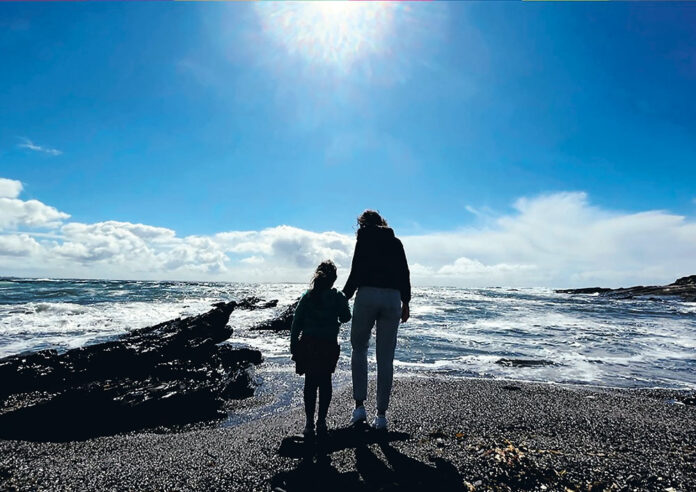A mum at 17 just after her Leaving Cert, Rachel O’Connor spoke to Owen Ryan about her journey and featuring in a documentary on single mothers
NEARLY everyone who does the Leaving Cert finds it stressful, but there are different levels of stress.
Rachel O’Connor did her Leaving Cert six years ago. At the tender age of 17 she was eight months pregnant, and as stressful as that on its own would have been, it was even more difficult as she had kept her situation to herself.
Other students would have felt they had plenty on their plate with theorems, formulas, French and Irish grammar, Rachel had all of that on her mind, along with the fact that she was on the brink of becoming a mother, while still a child herself.
Her daughter Ella will turn six in a few weeks, and since her birth Rachel has gone on to get a degree from Mary Immaculate College and is now halfway through a two-year postgraduate course to qualify as a secondary school teacher.
She is also one of the subjects of a documentary by Leah Moore entitled Deliver that was screened as part of the Lasta festival last week.
Being a teenage mother in Ireland has often been difficult, even harrowing, in the last 100 years, as evidenced by the existence of Mother and Baby homes and incidents like the death of Ann Lovett, which showed how destructive the stigma around single motherhood could be.
While Ireland had given up on incarcerating young mothers and taking their children from them by the time Rachel found herself pregnant, she was still very conscious of negative perceptions of girls in her situation.
Worried and lonely, she tried to lose herself in her studies, and kept her secret to herself.
“The pregnancy was a surprise and a shock and I think I just threw myself into studying as a means of coping with it. It was a bit of a distraction and it kept me going.”
In early June she went from her home in Doora to Rice College to do the exams day after day, not saying a word about the baby growing inside her.
“I was absolutely terrified. What shocks people the most is that I didn’t tell anyone until after I finished my exams.
“I’m quite tall and I didn’t have a big bump. I was quite isolated, just stuck into study, that’s all I could think about, because it was a huge trauma in my life.
“It’s great looking back on it now and seeing how far we’ve come. I’m blessed, Ella was such a good baby, she’s a great kid, she’s happy and healthy and that’s all I could want.”
Eventually, just a few weeks before Ella arrived, Rachel told her family that there was another little person on the way.
Telling her parents was very hard, but when it was done, she found she had great support.
“It was one of the main things I was fearful of, how they would react, it was probably one of the scariest parts for me. There’s such a stereotype on young mothers, a burden on their family, bringing shame to them and stuff.
“The first time I went into the doctor after I told my Mam, he said nothing bad is going to come from this baby. That’s so true, They’ve supported me and they always will. They’re brilliant.”
She has very warm memories of the reaction that followed her news, as everyone in the house got behind her, and they prepared for Ella’s arrival together.
“I’m the oldest of three girls, and it was a big surprise to everybody. They’re so supportive, so good. We’re still living at home, and I never felt such a sense of support before, all of my family gathered around me.
“There was still stuff from when we were kids out in the garage that we pulled out. She has my cot from when I was a baby. Everyone rallied together and it was lovely. Even now, we’re kind of heading towards moving out and Mom is like ‘God, I don’t know what I’ll do without ye in the house’.”
On the Leaving Cert Irish curriculum is a play called An Triail. Written in the 1960s by Clare woman Máiréad Ní Ghráda it tells the story of a young single woman who is shunned after becoming pregnant and it is something that Rachel was studying, throughout her own pregnancy.
The play reflects a prejudice against single mothers that clearly isn’t as prevalent now as it was 60 years ago, but Rachel says there is definitely still a stigma around girls in the position she was in.
“Oh absolutely, that’s definitely ingrained for a few generations.”
While the months leading up to it hadn’t been easy, the day Ella was born was an unforgettable one for Rachel.
“It was the best day ever, you never forget that moment. I was terrified out of my wits, but my Mam was with me. One of the midwifes said to me it doesn’t matter what age you are, when you’re having your first baby you’re going to be terrified and nothing can prepare you for it. I’ve done well so far, she’s still here anyway!” she laughs.
Rachel had planned to take a year out after Ella’s birth, but a year turned out to be a few short weeks, as she started college in September.
“My Mam helped out for a while, she wasn’t working as much at the time. The creche that Ella went to, my dad is on the board of it, the Clare Family Resource Centre.
“Ella ended up going to the creche early enough, it was really nice, some of the girls that minded her had minded me as a baby. I’d say it was weird for them to see that, but it was lovely to have that closeness.”
She also credits Maureen Keane in the creche for giving her encouragement, and seeing that progressing her education without a year’s break was an option for her.
Most parents would agree the months after the birth of a first child is a challenging time, but as a teenager starting a college course, it must have been much more difficult for Rachel.
Other students her age could have concentrated on making friends, socialising and maybe doing a bit of study, but she had to think about feeding and minding her daughter and the million quotidian tasks that go with having a small child.
“There’s a parent support group in Mary I, but it’s really more for mature students that have kids. It was tough for me being a student of college age, but also being a student parent and also dealing with everything outside of college.
“I found it hard to be honest, I didn’t really love it, but I’m glad I did it. The first year was an absolute blur, I don’t really remember much of it, it was just manic, I took it bit by bit.”
In 2019 she graduated and began a year off from academia, which she spent working as a sub teacher. Last September she began her Masters, in the same month as Ella began junior infants. Studying and having to mind Ella while the schools were closed was difficult and busy, but she got through it.
“With Covid I don’t really feel like I have done a year, because I haven’t set foot in Galway yet. It’s nice to have it under my belt and I’ve another year of it now, so it’s good to be halfway there.
“It’s very tough, that third lockdown after Christmas was really hard, I was back to online lectures from January 4 and then I had four weeks teaching online in the middle of it.
“Obviously the school was closed and I had Ella hanging off me and I was stuck on the laptop at the same time. It was really, really hard. But again, I’m glad it’s behind me and I wasn’t the only person in that position, you know?”
When the chance came to share her story for the documentary being screened this week, she jumped at the opportunity.
“Doug (Reddan) is curating the Lasta festival in Glór, he’s my best friend, I’d say we’ve been friends for nearly ten years. His friend Leah is creating the documentary.
“He just came to me with an idea one day. We were talking one day about my whole experience of being a young Mom, and he would have been there for that part of my life.
“He was saying that Leah had a real interest in making something like this, there is no positive portrayal of a young mother in general media, it’s always a social welfare recipient, living in a Council house.
“Leah really wanted to put a different spin on it, she is fantastic, I’d trust her with my life, it’s a very personal story, she was very delicate in how she asked the questions and everything. There was nothing that was out of bounds and I’m dying to see the final product now.”
She says participating also proved cathartic for her.
“Oh definitely. I’m getting lots of closure at the moment and it’s definitely helped as well. Ella was so excited about it as well, she was like ‘we’re going to be in a movie!’.”
When she was in her last days as a student at Rice College she was going through a very dark, lonely time, confused and scared about what was happening.
Reluctantly she went back there to do teaching practice, and she was very glad afterwards.
“I didn’t want to go back there because it’d bring everything back to me, but I’m glad I did, because everything was brought up and it’s been dealt with. I finally got closure on that time.”
Rachel goes to counselling now, and she says that has also helped her to become much more content.
“It has changed everything and I’m really invested in the process. I was really lucky with the therapist that I found, she’s brilliant and she’s done such great work with me.”
She says she is “happy out” nowadays, and enjoys swimming, exercise and reading, giving her a few outlets outside of study and motherhood.
Six years on from a hugely stressful time in her life, says she would advise that 17-year-old girl to ask for the help she needed, while she is proud of the resilience she has shown.
Excited about the creation of the documentary, she says she hopes it will help some of those who watch it.
“If anybody can take anything from it, I’d love it, because it is a positive story, not a bad one.”
Owen Ryan has been a journalist with the Clare Champion since 2007, having previously worked with a number of other publications in Limerick, Cork and Galway. His first book will be published in December 2024.



